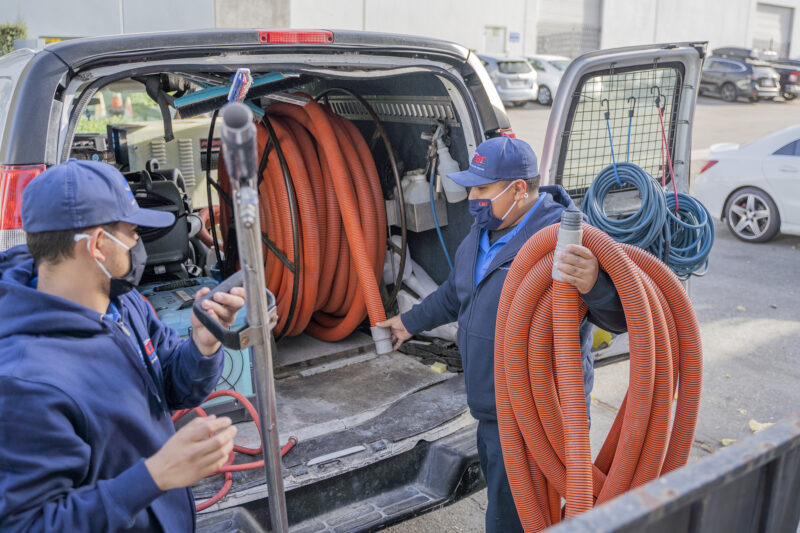Given the busy lives that we lead, it’s no surprise that planning for some distant emergency isn’t at the top of many to-do lists.
Disasters come in a number of varieties, from earthquakes to fires to wind damage and even burst pipes or sewage backflow. Nearly half of U.S. adults do not have the resources and plans in place in the event of an emergency, according to the U.S. Centers for Disease Control and Prevention.
In fact, 48% of Americans don’t have emergency supplies, and 44% don’t even have a basic first aid kit in their home.
Regardless of how prepared their customers are, it’s the job of restoration companies to be there for their customers when disaster does strike.


CBC Cleaning & Restoration
Owners Debbie and Gordon Glasnow purchased CBC in 1981, originally doing carpet and upholstery cleaning before transforming the company into full-service restoration.
Since then, CBC has grown and now tackles water, mold, fire and smoke damage, handling emergencies 24/7, along with every aspect of the restoration process, from cleaning to repair to reconstruction.
For the Glasnows, who’ve now been in operation for more than 40 years, not only is it important for their staff to be well-trained, knowledgeable and experienced, but also that they have empathy, as dealing with these emergencies is often a very difficult time for their customers.
This often entails a lot of communication, as they walk their customers through the process step-by-step, Debbie Glasnow said, adding that they also go to bat for customers with insurance companies to ensure they get what they deserve.
For more information, visit cbcfirst.com.



CORE by DeDona Restoration
Just last month, President and CEO Michael Fitzgibbons celebrated the grand opening of his restoration company, which handles water, mold, sewage, pack-outs and COVID-19 disinfection.
While Fitzgibbons has been in the restoration business in various roles for more than 30 years, DeDona was born in the midst of the pandemic, after Fitzgibbons got pushback when giving breaks to customers facing economic hardship.
“I just decided that I wanted to try and open up my own company and make a difference in the industry,” Fitzgibbons said, adding that he, too, wants to ensure customers come first. “No matter how big or how small the loss is … it’s the worst thing in the world for that customer, so you have to be compassionate.”
For more information, visit dedonarestoration.com.



Paul Davis Restoration of Santa Clarita
“We’re service-oriented people, and we really genuinely want to help others in their time of crisis,” said Susan Moss of her and her husband Joel’s choice to delve into the restoration industry.
After trying to do so on their own, the Mosses decided instead to work with a franchise to ensure they could provide the best quality services to their customers.
“We knew that it takes more to get into the industry — it takes nationwide (efforts),” Susan said.
The Mosses then incorporated JP Moss Construction, Joel’s longtime construction company, into Paul Davis to create a full-service restoration company that has now been in operation for 10 years locally.
In addition to local disasters, the Santa Clarita franchise responds to national disasters, from hurricanes and tornados to winter storms and wildfires, most recently responding to Louisiana for Hurricane Ida last month.
For more information, visit santaclarita.pauldavis.com.


Preparing for when disaster strikes
- Do routine leak inspections, checking under the sink and around pipes for signs of a leak, such as a musty smell or water damage.
- Mold means there is moisture, so if you see or smell mold, don’t ignore it — get it checked.
- Keep track of your water heater’s expiration date.
- Clean out your gutters routinely, as they can back up and leak through the roof and into the home.
- Check your landscaping to ensure irrigation has good drainage and isn’t seeping into the home.
- Make sure important papers are put away — preferably in a water- and fireproof container — that is easy to grab if you need to evacuate.
- Have recent photos of your home and each room saved as a digital inventory.
- Create an emergency supply kit that includes things like nonperishable food and water, a flashlight and first aid kit.
- Prepare your home for a fire by making sure you have brush clearance around your property, such as removing dry brush and vegetation from around structures.
- Prepare your home for an earthquake by bolting down heavy furniture and other objects that could fall.













